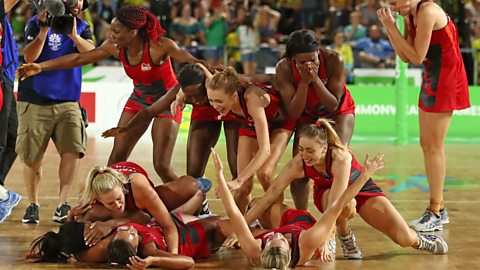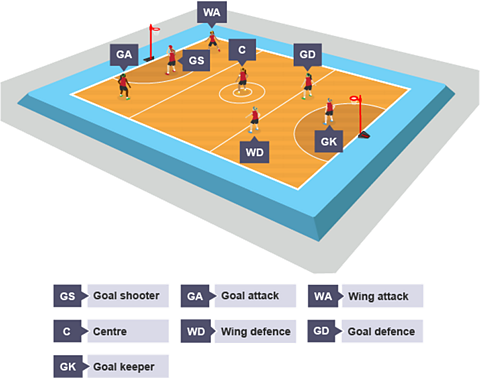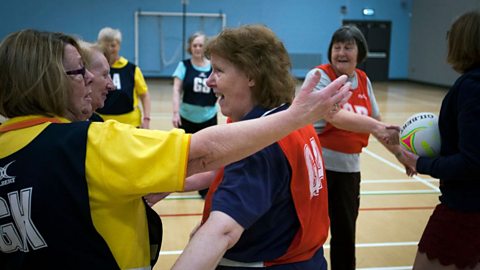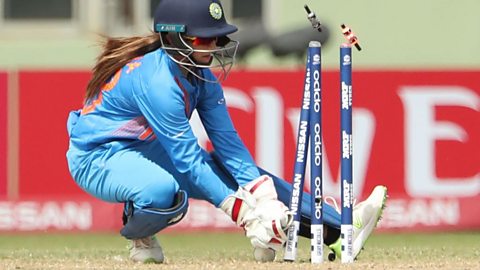This year the Netball World Cup is being hosted in Liverpool, but despite the sportтs growing popularity, not everyone knows the lingo.
Scratches, bent back fingers, sprained ankles - netball is not for the faint-hearted. Itтs quick, skillful, maybe even a bit brutal, and like all sports has its own secret language.
Hereтs our beginnerтs guide to netball jargon.

For anyone with seriously no clue about netball, the basic premise of the game is to get the ball through the net more times than the other team. The important thing to remember is that you cannot run with the ball.
Players pass the ball between each other and try to avoid interception from their opponents. The aim is to get the ball to the shooters who will attempt to throw the ball through a netted hoop to score a point.
A match is split into 15-minute quarters with a three-minute break between the first and second and the third and fourth quarters. Half-time lasts five minutes. Teams change ends after each quarter.

Bibs and Offside
There are seven players on a netball team and they all have a different position. They wear bibs with the initials of their position so that the umpire can identify who is who. For example; Goal Attack (GA), Wing Attack (WA) and Centre ТЉ.
The umpire needs to know which player is which because of netballтs offside rule. Players can only move into certain parts of the court, with or without the ball, depending on their position.
If they move into an area not designated for their position this will result in a free pass being awarded to the opposing team.
Not something you want to give away.
Find out more about the positions in this .

Footwork
In netball you cannot run or dribble with the ball.
Unlike in dance, football or boxing, footwork in netball is not a good thing. Being quick and nimble is necessary of course, but if you lift and reground your landing foot when in possession of the ball, this is called тfootworkт and it is not allowed.
Three-second rule
No, weтre not talking about when you drop a piece of chocolate on the floor.
Once a player has the ball they must pass it on within three seconds, this is to keep the game moving quickly. If a player doesnтt release the ball in three seconds the umpire will award the defending team a free pass.
Pivot!
You might be familiar with the exclamation "Pivot!" from Ross Gellerтs sofa incident in 1990s classic sit-com Friends, in which he unsuccessfully tries to move a sofa up the stairs. Well, pivoting is a lot more useful in netball.
A player can pivot (rotate on the ball of their landing foot) to change direction to make their next pass or to shoot.
Not a 'non-contact sport'
One of the worst things you can say to a netball player is that netball is a non-contact sport. Players often come off the pitch with cuts and bruises, and even dislocated shoulders.
Contact is only permitted if it does not impede an opponent or general play. For example, if two players accidentally collide when running for the ball then the umpire will not blow the whistle and play will continue.
But if a player interferes with play or uses their body to gain an unfair advantage over their opponent, like smashing into them so they canтt catch the ball - that would be an infringement.

Obstruction
Obstruction of a player in possession of the ball
When a player attempts to intercept or defend the ball they must be at least 3ft (0.9m) away from the player in possession. This is why you often see netball players on their tip toes with their arms up in the air.
Obstruction of a player not in possession of the ball
When marking a player without the ball you can go within the 3ft mark but you cannot obstruct the player by putting your arms out to the side.
You should keep your arms down, in a natural position, unless catching, deflecting, intercepting a pass, fake pass or rebound - or to momentarily signal for a pass or an intended direction of movement.

"Here if you needт
тHere if you needт is a phrase youтll hear a lot in a netball match when looking to make a pass or finding space to shoot.
As well as the growing participation and media coverage, netball is becoming increasingly popular as a social sport.
Schools, universities and workplaces have netball teams and leagues for all ages and abilities, and menтs and mixed teams are getting more common.
Playing a team sport has many benefits - itтs good for your physical health and is a great way of making friends for young people and adults alike.
Your teammates are there for you when you need them, both on and off the pitch.

You can follow the Netball World Cup from Friday July 12 on TV and online with ТщЖЙЙйЭјЪзвГШыПк Sport.
This article was published in July 2019
The ultimate guide to Wimbledon jargon
How a let got its name and why it can take years to collect a dinner set

The cycling jargon you need to know about
Why you need to worry about bonking if you leave the peloton - and others.

Origins of cricket jargon
What do ducks have to do with cricket? Find out here.
